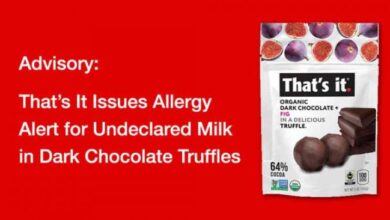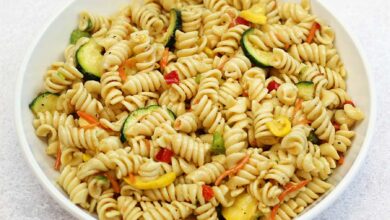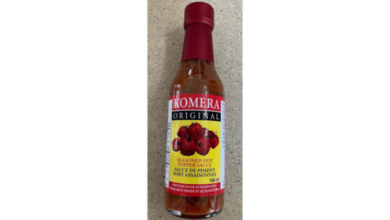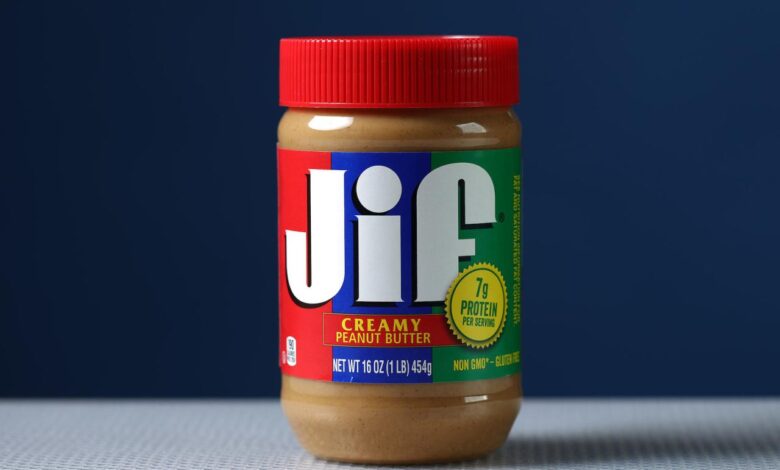
Select Jif Products Recalled for Potential Salmonella
Select Jif products recalled for potential Salmonella – a phrase that has sent ripples through kitchens and pantries across the country. This recent recall has brought the issue of food safety to the forefront, raising concerns about the potential health risks associated with consuming contaminated peanut butter.
While the news may be alarming, understanding the situation and taking the necessary precautions can help mitigate the risks.
The recall, announced by Jif, affects specific batches of peanut butter due to the detection of Salmonella. Salmonella is a bacterium that can cause serious foodborne illness, leading to symptoms like diarrhea, fever, and abdominal cramps. The contamination is believed to have originated from a specific manufacturing facility, prompting the company to take immediate action to remove affected products from shelves and inform consumers.
Jif Product Recall Announcement
Jif, a popular brand of peanut butter, has issued a voluntary recall of certain products due to the potential presence of Salmonella. The recall was announced on May 20, 2022, and affects various Jif peanut butter products with specific lot codes and best-by dates.
The recall is a precautionary measure to protect consumers from potential health risks associated with Salmonella contamination.
Reason for the Recall
The recall was initiated after an investigation by the Food and Drug Administration (FDA) revealed the presence of Salmonella in a Jif production facility. The FDA investigation identified the potential for Salmonella contamination in specific batches of Jif peanut butter.
Salmonella is a bacterium that can cause food poisoning, leading to symptoms like diarrhea, fever, and abdominal cramps.
Products Affected by the Recall
The recall affects specific Jif peanut butter products with lot codes ranging from 1274425 to 2140425. The affected products have best-by dates ranging from October 1, 2022, to January 1, 2024.
Jif recommends that consumers do not consume any Jif peanut butter products with the affected lot codes and best-by dates.
Steps Taken by Jif to Address the Recall
Jif has taken immediate steps to address the recall, including:
- Removing affected products from store shelves.
- Issuing a public recall announcement to inform consumers.
- Working with retailers to ensure the removal of affected products.
- Providing a toll-free hotline for consumers to ask questions and report any issues.
Potential Health Risks Associated with Consuming Recalled Products, Select jif products recalled for potential salmonella
Consuming products contaminated with Salmonella can lead to food poisoning. Symptoms of Salmonella poisoning typically include diarrhea, fever, and abdominal cramps. In some cases, the infection can be severe and lead to hospitalization.
Steps for Consumers to Take
Consumers who have purchased Jif peanut butter products with the affected lot codes and best-by dates are advised to:
- Check their peanut butter jars for the lot code and best-by date.
- Discard any affected products immediately.
- Contact Jif’s consumer hotline for any questions or concerns.
Jif’s Official Statement Regarding the Recall
Jif has issued an official statement regarding the recall, expressing concern for consumer safety and emphasizing the importance of taking immediate action to remove affected products from circulation.
“The safety of our consumers is our top priority. We are taking this recall very seriously and are working diligently to ensure that all affected products are removed from store shelves and consumers are informed. We apologize for any inconvenience this may cause.”
Salmonella Contamination
Salmonella contamination is a serious food safety concern, potentially causing severe illness. This section will discuss the potential health risks associated with Salmonella contamination, including symptoms, complications, and vulnerable populations. It will also explain the source of the Salmonella contamination in Jif products and the potential factors that contributed to the contamination.
Lastly, it will provide information about the testing methods used to identify Salmonella contamination in food products.
Health Risks Associated with Salmonella Contamination
Salmonella contamination can lead to a severe illness called salmonellosis. Symptoms typically appear within 12 to 72 hours after consuming contaminated food and can include diarrhea, fever, abdominal cramps, nausea, and vomiting. While most individuals recover within a few days, some may experience more severe complications.
Complications of Salmonella Infection
Salmonella infection can lead to various complications, especially in vulnerable populations.
Vulnerable Populations
- Infants and young children: Infants and young children are more susceptible to severe complications from Salmonella infection, including dehydration and sepsis.
- Elderly individuals: Elderly individuals have weakened immune systems, making them more vulnerable to severe complications.
- Individuals with compromised immune systems: Individuals with compromised immune systems, such as those undergoing chemotherapy or with HIV/AIDS, are at increased risk of severe complications.
Source of Salmonella Contamination in Jif Products
The source of Salmonella contamination in Jif products is currently under investigation. However, preliminary investigations suggest that the contamination may have originated from the manufacturing facility.
Potential Factors Contributing to Contamination
Several factors could contribute to Salmonella contamination in food products, including:
- Improper sanitation and hygiene practices: Inadequate sanitation and hygiene practices at the manufacturing facility could lead to the contamination of food products. This includes inadequate cleaning of equipment, improper handwashing, and cross-contamination.
- Contaminated ingredients: Salmonella contamination can occur if ingredients used in food production are contaminated. This could be due to improper handling, storage, or processing of ingredients.
- Environmental contamination: Salmonella can be present in the environment, such as in soil, water, or on surfaces. Contamination can occur if food products come into contact with contaminated environments.
Testing Methods for Salmonella Contamination
Various testing methods are used to identify Salmonella contamination in food products. These methods include:
- Culture-based methods: Culture-based methods involve growing Salmonella bacteria in a laboratory setting. This method is considered the gold standard for Salmonella detection.
- Molecular methods: Molecular methods, such as polymerase chain reaction (PCR), detect Salmonella DNA in food samples. This method is faster and more sensitive than culture-based methods.
- Immunological methods: Immunological methods use antibodies to detect Salmonella antigens in food samples. This method is relatively quick and easy to perform.
Consumer Impact: Select Jif Products Recalled For Potential Salmonella
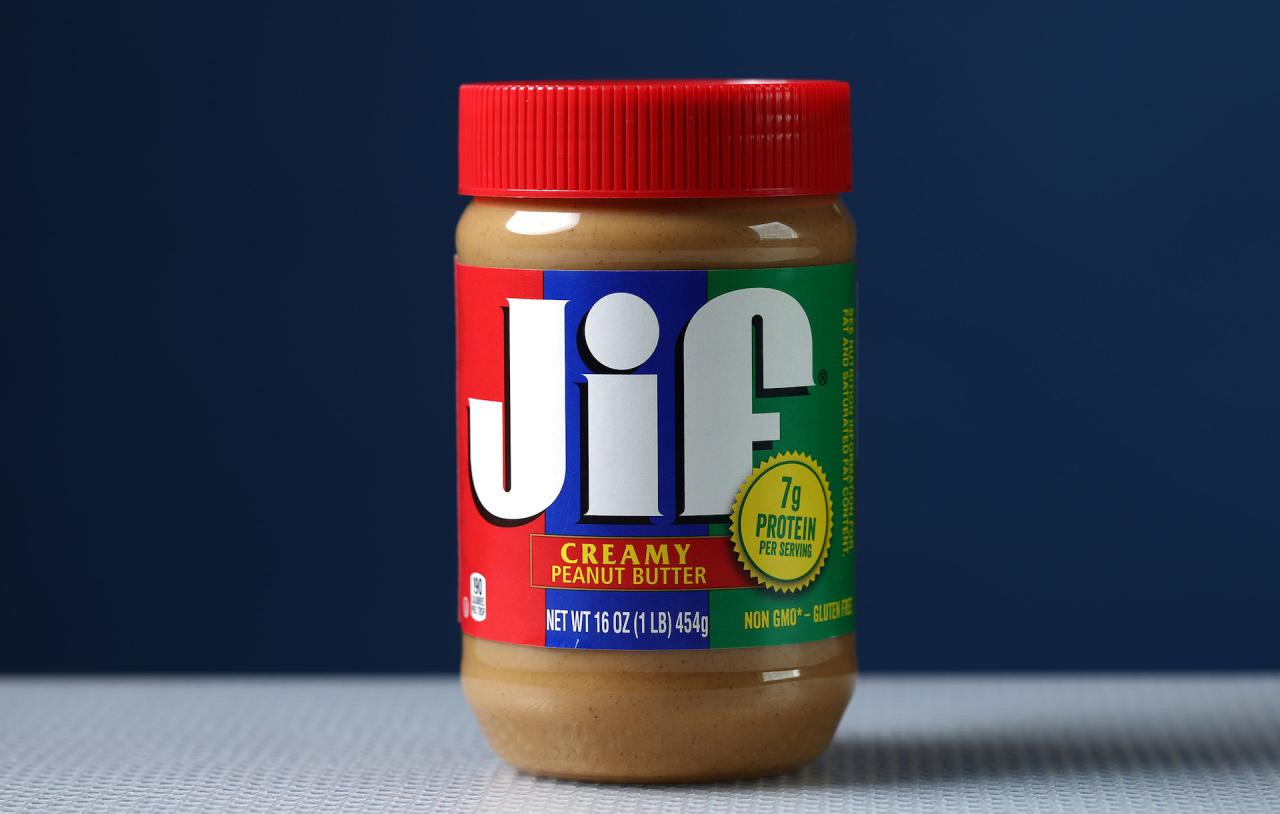
The Jif peanut butter recall has had a significant impact on consumers, causing inconvenience, potential financial loss, and health concerns. Consumers have been forced to deal with the hassle of returning contaminated products, potentially losing money on spoiled goods, and worrying about the potential health risks associated with salmonella contamination.
Consumer Reactions and Reports
The recall has sparked a wave of reactions from consumers, ranging from frustration to concern. Some consumers have expressed disappointment and anger at the inconvenience caused by the recall, while others have voiced their worries about the potential health risks.
Social media platforms have been abuzz with discussions about the recall, with many consumers sharing their experiences and concerns. There have been reports of illness linked to the consumption of recalled Jif products, prompting some consumers to seek medical attention.
Steps to Take if You Have Purchased Recalled Jif Products
If you have purchased any of the recalled Jif products, it is crucial to take immediate action to protect your health and prevent further contamination. Here are the steps you should take:
- Check the product label:Carefully examine the label of your Jif peanut butter to see if it matches any of the recalled product codes. The product codes can be found on the bottom of the jar. If your product is listed on the recall list, do not consume it.
- Return the product:If you have a recalled Jif product, return it to the store where you purchased it for a full refund. You can also dispose of the product safely by following the instructions provided by the manufacturer or your local waste management authority.
It’s been a rough week for peanut butter lovers, with select Jif products recalled due to potential salmonella contamination. But hey, at least we have something else to distract us, right? Forget Twitter, this Musk is into toe-curling yumminess ! Who knew that Elon Musk was such a foodie?
Anyway, back to the Jif situation, make sure you check your jars and stay safe out there!
- Seek medical attention if necessary:If you have consumed any of the recalled Jif products and are experiencing symptoms of salmonella poisoning, such as diarrhea, fever, abdominal cramps, and nausea, seek immediate medical attention. Early diagnosis and treatment can help prevent complications.
Jif’s Response
Jif, a popular peanut butter brand owned by the J.M. Smucker Company, swiftly responded to the salmonella contamination recall. The company implemented a multi-pronged approach to address the situation, focusing on consumer safety, transparency, and rebuilding trust.
Communication Strategy
Jif’s communication strategy prioritized transparency and immediate action. The company issued a press release announcing the recall, detailing affected products and providing contact information for consumers. Jif also utilized its website, social media platforms, and public service announcements to disseminate information.
This multi-channel approach ensured widespread reach, allowing consumers to access crucial information promptly.
Addressing Consumer Concerns
Jif acknowledged the potential health risks posed by the contaminated products and expressed sincere concern for affected consumers. The company provided detailed instructions on how to identify recalled products, offered refunds, and established a dedicated customer service hotline to address questions and concerns.
The news about select Jif products being recalled for potential salmonella contamination is definitely a bummer. It’s always a good idea to check your pantry and make sure you haven’t got any affected jars. But while we’re on the topic of safety and health, I’m reminded of the ongoing fight for reproductive rights, and I have to ask: will the pro-abortion rights billionaires please stand up will the pro abortion rights billionaires please stand up and use their resources to help ensure that women have access to safe and legal abortions?
Back to the Jif recall, it’s important to be vigilant about food safety, but it’s also important to be aware of the broader issues that impact our health and well-being.
Jif also proactively collaborated with the Food and Drug Administration (FDA) to investigate the source of the contamination and implement preventive measures.
Effectiveness of Jif’s Response
Jif’s response to the recall was generally well-received by consumers and industry experts. The company’s swift and transparent communication, proactive measures to address consumer concerns, and collaboration with regulatory agencies were praised. However, some critics argued that the recall could have been initiated earlier, potentially preventing more illnesses.
Impact on Jif’s Reputation
While the recall undoubtedly impacted Jif’s reputation, the company’s prompt and comprehensive response helped mitigate potential damage. The recall highlighted the importance of food safety and transparency, reminding consumers of the crucial role companies play in ensuring the safety of their products.
Comparison to Past Food Recalls
Jif’s response to the recall aligns with best practices established in previous food safety incidents. The company’s communication strategy, focus on consumer safety, and collaboration with regulatory agencies mirror successful approaches implemented by other companies during similar situations.
Jif’s Overall Approach to Food Safety
Jif has a long history of prioritizing food safety and quality. The company has implemented rigorous quality control measures and adheres to industry best practices to ensure the safety of its products. However, the recent recall highlights the importance of continuous improvement and vigilance in maintaining food safety standards.
It’s a crazy week, right? First, we’ve got the Jif peanut butter recall due to potential salmonella contamination, and now, it seems like there’s another issue brewing: christian nationalism on the rise in some GOP campaigns. I’m not sure what’s more alarming, the thought of a salmonella outbreak or the potential for political extremism to take hold.
I guess we’ll just have to wait and see how things unfold. In the meantime, maybe I’ll stick to almond butter for a while.
Preventing Future Recalls
The Jif peanut butter recall serves as a stark reminder of the importance of robust food safety practices. Preventing future recalls requires a multi-pronged approach, encompassing improved food safety practices, enhanced testing procedures, and stronger regulatory oversight. This includes implementing comprehensive measures to ensure food safety throughout the entire supply chain, from raw materials to finished products.
Enhanced Testing Procedures
Effective testing procedures are crucial in identifying potential contaminants before they reach consumers. Manufacturers should implement rigorous testing protocols at various stages of production, including raw materials, intermediate products, and finished goods. These tests should be conducted using validated methods that are sensitive and specific to the potential contaminants of concern.
- Expand Testing Scope:Expand testing beyond routine checks to include a broader range of potential contaminants, including those that are emerging or less commonly detected.
- Implement Real-Time Monitoring:Adopt real-time monitoring systems that provide continuous data on critical process parameters, such as temperature, humidity, and pressure, allowing for immediate detection of deviations and prompt corrective actions.
- Utilize Advanced Technologies:Invest in advanced technologies such as DNA-based testing, rapid detection kits, and mass spectrometry to improve the accuracy, speed, and sensitivity of testing.
Improved Food Safety Practices
Food safety practices are essential for preventing contamination and ensuring the safety of food products. Manufacturers should adhere to strict hygiene and sanitation standards throughout the production process, from receiving raw materials to packaging finished products.
- Employee Training and Education:Provide comprehensive training to all employees on food safety practices, including proper handwashing, hygiene, and sanitation procedures. Regular refresher courses should be offered to ensure ongoing knowledge and compliance.
- Effective Cleaning and Sanitization:Establish and maintain a rigorous cleaning and sanitization program for all equipment, facilities, and work areas. This includes regular cleaning, disinfection, and verification of sanitation effectiveness.
- Pest Control:Implement a comprehensive pest control program to prevent pests from accessing food production areas. This includes regular inspections, effective trapping and elimination measures, and monitoring for pest activity.
- Allergen Control:Establish clear protocols for managing allergens, including segregation of ingredients, dedicated equipment, and labeling requirements. This helps prevent cross-contamination and ensures the safety of individuals with food allergies.
Closing Summary
The Jif product recall serves as a stark reminder of the importance of food safety and the need for vigilance in preventing foodborne illnesses. While the recall has caused inconvenience and raised concerns, it also highlights the proactive measures taken by food manufacturers to protect consumers.
As we navigate this situation, it’s essential to stay informed, follow the guidelines provided by health officials, and prioritize our well-being.

